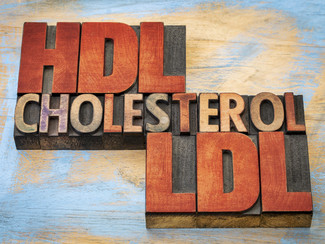
Red Yeast Rice, Cholesterol, and You
In honor of Cholesterol Education Month, we are asking you an important question: have you had your cholesterol levels tested lately? The reason why we ask is because you cannot feel if you have high cholesterol levels. However, most health professionals believe that high cholesterol is a strong indicator of whether or not you will develop heart disease later in life. The Center for Disease Control and Prevention (CDC) estimates one in three of U.S. adults have high cholesterol. That's quite a few of us walking around, so it's important to get a test.
Once you get tested, cholesterol can be a bit confusing to understand. Here's a basic breakdown: there are two main types found in our bloodstream. One is low-density lipoprotein (LDL), and one is high-density lipoprotein (HDL). The LDL is what carries cholesterol around the body so it can be utilized properly. This is the number that people usually want to lower. Too much LDL, doctors believe, will stick to your arteries narrowing them and putting you at risk for heart disease. HDL is considered the good type of cholesterol because this is what transports cholesterol to your liver for elimination. If this number is high it shows that cholesterol is being eliminated from your body properly.
If you want to keep your numbers in check, proper diet and exercise go a long way keeping your cholesterol in the target range. If you already think you have a proper diet and feel that you are getting enough exercise yet you still can't get a handle on your numbers, there are supplements known to help control your cholesterol numbers. One of the most popular supplements in the natural products industry that does this is called red yeast rice.
Red yeast rice is an agent that has been popular in Chinese medicine for hundreds of years. It is an extract derived from a rice fermented with the yeast monascus purpureus, and is thought to work similarly to a contemporary statin drug, which block the production of cholesterol. In fact, the modern day drug lovastatin is derived from the active ingredient in red yeast rice, and at one point Merck, the manufacturer of lovastatin, tried to have red yeast rice taken off the market.
Statin drugs are an important way of managing high cholesterol in the pharmaceutical industry. They do lower cholesterol well, but also have many reported side effects such as muscle pain, raising blood sugar, and memory loss so they are not well tolerated by everyone. According to Phyllis A. Balch, CNC in her book Prescription for Nutritional Healing, Fifth Edition, red yeast rice has been shown in studies to be almost as effective as a statin drug but much better tolerated by a study's participants.
Red yeast rice works so well because it is similar, but not identical to a commercial statin drug. It has multiple compounds naturally occurring in nature that may lower cholesterol, such as phytosterols and isoflavones, while a statin drug is just one of the active components found in this extract, isolated and put in a much larger dose. This may explain why the side effects associated with statin drugs are reported to be much more severe than supplementation with red yeast rice.
Despite the fact there is some convincing research about red yeast rice, some health professionals feel not enough research has been done to declare it safe for long term use, so definitely speak to your health professional before taking it.
High cholesterol is a condition that affects many. Since you can't feel it, it makes getting tested a necessity. If you test high and have already tried diet and exercise to control it, supplementation with red yeast rice may be an excellent choice for you to balance your cholesterol levels. By mimicking the properties of statin drugs with less side effects red yeast rice should help keep your numbers in limits without hurting you. Now, thanks to diet and exercise combined with the right supplementation, high cholesterol no longer has to stop you from staying young at heart.
The information in this article is for general educational purposes only, and should not be construed or interpreted as medical advice. Always seek the advice of your physician or other qualified healthcare provider regarding any medical condition or treatment, and before undertaking a new heathcare regimen. Never disregard professional medical advice or delay in seeking it because of something you have read in this article or any linked materials.